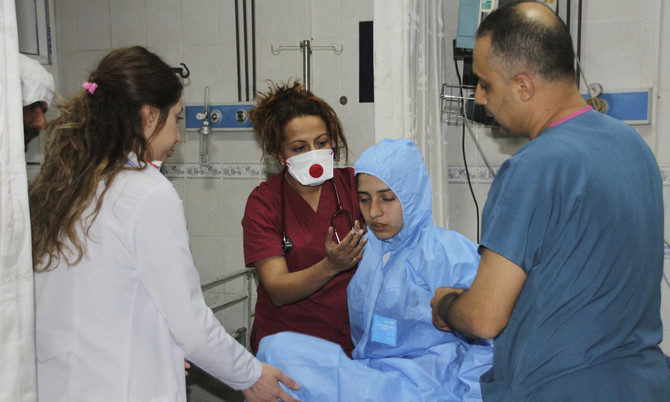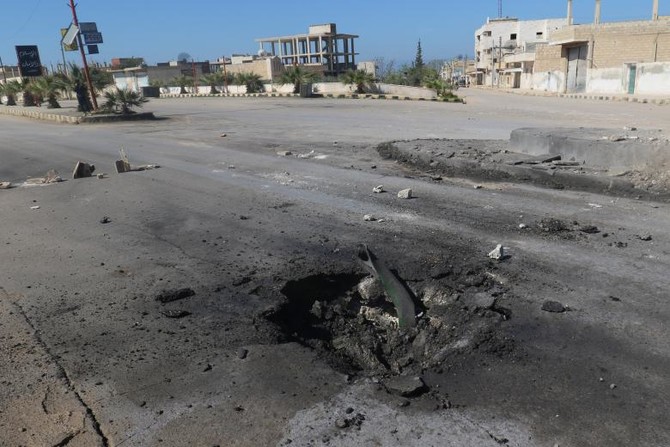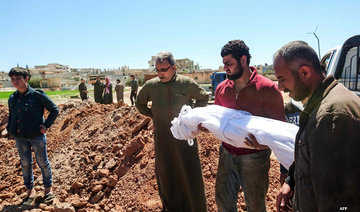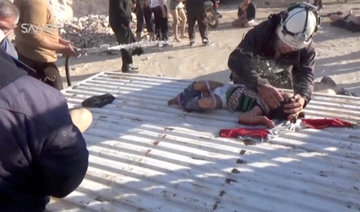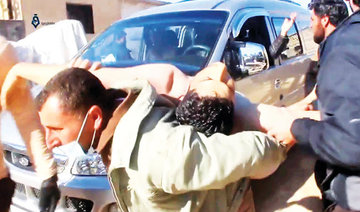BEIRUT, Lebanon: Turkey said Thursday that autopsies of Syrian victims from this week’s assault in Syria’s Idlib province show they were subjected to chemical weapons as France’s foreign minister called for the prosecution of President Bashar Assad’s government amid growing international outrage over the assault that activists say killed 86 people.
Damascus maintains it didn’t use chemical weapons, instead blaming the rebels for stockpiling the deadly substance.
“I stress, once again, that the Syrian Arab Army did and will not use such weapons even against the terrorists who are targeting our people,” Syria’s Foreign Minister Walid Moallem told reporters in Damascus.
In Turkey, state-run Anadolu and the private DHA news agencies quoted Justice Minister Bekir Bozdag as saying that “it was determined after the autopsy that a chemical weapon was used.”
Turkish officials say that close to 60 victims of the attack were brought to Turkey for treatment and three of them died.
Tuesday’s attack happened just 100 kilometers (60 miles) from the Turkish border, and the Turkish government — a close ally of Syrian rebels — set up a decontamination center at a border crossing in the province of Hatay, where the victims were initially treated before being moved to hospitals.
Russia’s Defense Ministry said the toxic agents were released when a Syrian airstrike hit a rebel chemical weapons arsenal and munitions factory on the town’s eastern outskirts.
At the press conference in Damascus, Moallem also echoed that statement, saying the Syrian army bombed a warehouse belonging to Al-Qaeda’s branch in Syria which contained chemical weapons. He did not say whether the government knew in advance that the warehouse contained chemical weapons.
Asked whether his country would give access to a fact-finding mission over the use of chemical weapons, he said: “Our experiences with international investigating committees were not encouraging, because they come out of Damascus with certain indications which then change at their headquarters.”
He said Damascus wants guarantees that any investigation would be impartial and non-politicized. He also said such a committee should start from Damascus and not from Turkey. “Once we reach convincing answers we will give our answer,” he said.
The area of the town is difficult to access and as more time passes in the aftermath of the attack, it will be increasingly difficult to determine exactly what happened.
Turkish media have reported that World Health Organization experts took part in the autopsies of Syrian victims conducted in a hospital in the Turkish city of Adana late Wednesday.
In France, Foreign Minister Jean-Marc Ayrault urged for a resumption of Syrian peace talks and said he wants Assad’s government prosecuted over its alleged use of chemical weapons.
He told CNews television on Thursday that a new UN resolution and Syrian peace negotiations should be a top priority — not rushing into new military interventions. Ayrault said that “France is still seeking to talk with its partners on the Security Council ... Russia in particular.”
“These crimes must not remain unpunished. ... One day, international justice will rule on Assad,” Ayrault said.
Russia argued at a UN Security Council meeting on Wednesday against holding Assad’s government responsible for the Idlib attack. The US ambassador to the United Nations, Nikki Haley, warned that the Trump administration would take action if the Security Council did not.
US President Donald Trump and other world leaders said the Syrian government was to blame, but Moscow, a key ally of Assad, said the assault was caused by a Syrian airstrike that hit a rebel stockpile of chemical arms.
Early US assessments showed the use of chlorine gas and traces of the nerve agent sarin in the attack Tuesday that terrorized Khan Sheikhoun, according to two US officials who weren’t authorized to speak publicly on the matter and demanded anonymity.
The effects of the attack overwhelmed hospitals around the town, leading paramedics to send patients to medical facilities across rebel-held areas in northern Syria, as well as to Turkey. The Turkish Health Ministry said three victims died receiving treatment inside its borders. The Britain-based Syrian Observatory for Human Rights monitoring group put the toll so far at 86 killed.
Victims of the attack showed signs of nerve gas exposure, the World Health Organization and Doctors Without Borders said, including suffocation, foaming at the mouth, convulsions, constricted pupils and involuntary defecation. Paramedics were using fire hoses to wash the chemicals from the bodies of victims.
Medical teams also reported smelling bleach on survivors of the attack, suggesting chlorine gas was also used, Doctors Without Borders said.
The magnitude of the attack was reflected in the images of the dead — children piled in heaps for burial, a father carrying his lifeless young twins.
The visuals from the scene were reminiscent of a 2013 nerve gas attack on the suburbs of Damascus that left hundreds dead and prompted an agreement brokered by the US and Russia to disarm Assad’s chemical stockpile. Western nations blamed government forces for that attack, where effects were concentrated on opposition-held areas.
___
Fraser reported from Ankara, Turkey. Associated Press writer Albert Aji contributed to this report from Damascus, Syria.
Syria autopsies show chemical weapons used in attack — Turkey
Syria autopsies show chemical weapons used in attack — Turkey
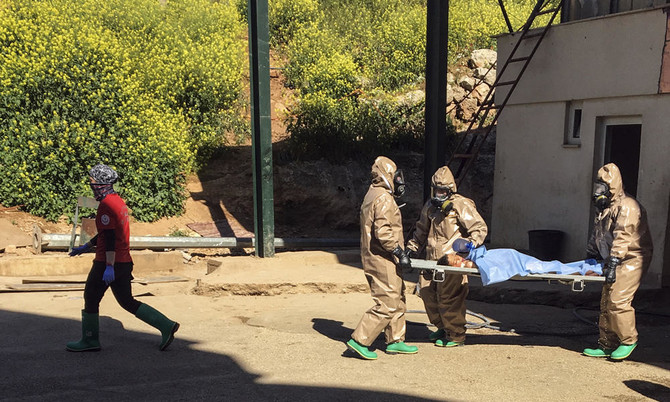
Iraq begins repatriating Syrian soldiers amid border security assurances

DUBAI: Iraq has begun the process of returning Syrian soldiers to their home country, according to state media reports on Wednesday.
Lt. Gen. Qais Al-Muhammadawi, deputy commander of joint operations, emphasized the robust security measures in place along Iraq’s borders with Syria.
“Our borders are fortified and completely secure,” he said, declaring that no unauthorized crossings would be permitted.
Muhammadawi said that all border crossings with Syria are under tight control, stating: “We will not allow a terrorist to enter our territory.”
Turkiye won’t halt Syria military activity until Kurd fighters ‘disarm’

ISTANBUL: Turkiye will push ahead with its military preparations until Kurdish fighters “disarm,” a defense ministry source said Thursday as the nation faces an ongoing threat along its border with northern Syria.
“Until the PKK/YPG terrorist organization disarms and its foreign fighters leave Syria, our preparations and measures will continue within the scope of the fight against terrorism,” the source said.
Hamas says Israeli strikes in Yemen ‘dangerous development’

GAZA: Palestinian militant group Hamas said Thursday that Israel’s strikes in Yemen after the Houthi rebels fired a missile at the country were a “dangerous development.”
“We regard this escalation as a dangerous development and an extension of the aggression against our Palestinian people, Syria and the Arab region,” Hamas said in a statement as Israel struck ports and energy infrastructure in Yemen after intercepting a missile attack by the Houthis.
Separated for decades, Assad’s fall spurs hope for families split by Golan Heights buffer zone

- Golan Heights is a rocky plateau that Israel seized from Syria in 1967 and annexed in 1981
- US is the only country to recognize Israel’s control; the rest of the world considers the Golan Heights occupied Syrian territory
MAJDAL SHAMS, Golan Heights: The four sisters gathered by the side of the road, craning their necks to peer far beyond the razor wire-reinforced fence snaking across the mountain. One took off her jacket and waved it slowly above her head.
In the distance, a tiny white speck waved frantically from the hillside.
“We can see you!” Soha Safadi exclaimed excitedly on her cellphone. She paused briefly to wipe away tears that had begun to flow. “Can you see us too?”
The tiny speck on the hill was Soha’s sister, Sawsan. Separated by war and occupation, they hadn’t seen each other in person for 22 years.
The six Safadi sisters belong to the Druze community, one of the Middle East’s most insular religious minorities. Its population is spread across Syria, Lebanon, Israel and the Golan Heights, a rocky plateau that Israel seized from Syria in 1967 and annexed in 1981. The US is the only country to recognize Israel’s control; the rest of the world considers the Golan Heights occupied Syrian territory.
Israel’s seizure of the Golan Heights split families apart.
Five of the six Safadi sisters and their parents live in Majdal Shams, a Druze town next to the buffer zone created between the Israeli-controlled Golan Heights and Syria. But the sixth, 49-year-old Sawsan, married a man from Jaramana, a town on the outskirts of the Syrian capital, Damascus, 27 years ago and has lived in Syria ever since. They have land in the buffer zone, where they grow olives and apples and also maintain a small house.
With very few visits allowed to relatives over the years, a nearby hill was dubbed “Shouting Hill,” where families would gather on either side of the fence and use loudspeakers to speak to each other.
The practice declined as the Internet made video calls widely accessible, while the Syrian war that began in 2011 made it difficult for those on the Syrian side to reach the buffer zone.
But since the Dec. 8 fall of Syrian President Bashar Assad’s regime, families like the Safadis, are starting to revive the practice. They cling to hope, however faint, that regime change will herald a loosening of restrictions between the Israeli-controlled area and Syria that have kept them from their loved ones for so long.
“It was something a bit different. You see her in person. It feels like you could be there in two minutes by car,” Soha Safadi, 51, said Wednesday after seeing the speck that was her sister on the hill. “This is much better, much better.”
Since Assad’s fall, the sisters have been coming to the fence every day to see Sawsan. They make arrangements by phone for a specific time, and then make a video call while also trying to catch a glimpse of each other across the hill.
“She was very tiny, but I could see her,” Soha Safadi said. “There were a lot of mixed feelings — sadness, joy and hope. And God willing, God willing, soon, soon, we will see her” in person.
After Assad fell, the Israeli military pushed through the buffer zone and into Syria proper. It has captured Mount Hermon, Syria’s tallest mountain, known as Jabal Al-Sheikh in Arabic, on the slopes of which lies Majdal Shams. The buffer zone is now a hive of military and construction activity, and Sawsan can’t come close to the fence.
While it is far too early to say whether years of hostile relations between the two countries will improve, the changes in Syria have sparked hope for divided families that maybe, just maybe, they might be able to meet again.
“This thing gave us a hope … that we can see each other. That all the people in the same situation can meet their families,” said another sister, 53-year-old Amira Safadi.
Yet seeing Sawsan across the hill, just a short walk away, is also incredibly painful for the sisters.
They wept as they waved, and cried even more when their sister put their nephew, 24-year-old Karam, on the phone. They have only met him once, during a family reunion in Jordan. He was 2 years old.
“It hurts, it hurts, it hurts in the heart,” Amira Safadi said. “It’s so close and far at the same time. It is like she is here and we cannot reach her, we cannot hug her.”
Israel’s deprivation of water in Gaza is act of genocide – Human Rights Watch

- ‘What we have found is that the Israeli government is intentionally killing Palestinians in Gaza by denying them the water that they need to survive’
- Israel’s campaign has killed more than 45,000 Palestinians, displaced most of the 2.3 million population and reduced much of the coastal enclave to ruins
THE HAGUE: Human Rights Watch said on Thursday that Israel has killed thousands of Palestinians in Gaza by denying them clean water which it says legally amounts to acts of genocide and extermination.
“This policy, inflicted as part of a mass killing of Palestinian civilians in Gaza, means Israeli authorities have committed the crime against humanity of extermination, which is ongoing. This policy also amounts to an ‘act of genocide’ under the Genocide Convention of 1948,” Human Rights Watch said in its report.
Israel has repeatedly rejected any accusation of genocide, saying it has respected international law and has a right to defend itself after the cross-border Hamas-led attack from Gaza on Oct. 7, 2023 that precipitated the war.
Although the report described the deprivation of water as an act of genocide, it noted that proving the crime of genocide against Israeli officials would also require establishing their intent. It cited statements by some senior Israeli officials which it said suggested they “wish to destroy Palestinians” which means the deprivation of water “may amount to the crime of genocide.”
“What we have found is that the Israeli government is intentionally killing Palestinians in Gaza by denying them the water that they need to survive,” Lama Fakih, Human Rights Watch Middle East director told a press conference.
Human Rights Watch is the second major rights group in a month to use the word genocide to describe the actions of Israel in Gaza, after Amnesty International issued a report that concluded Israel was committing genocide.
Both reports came just weeks after the International Criminal Court issued arrest warrants for Israeli Prime Minister Benjamin Netanyahu and his former defense chief for alleged war crimes and crimes against humanity. They deny the allegations.
The 1948 Genocide Convention, enacted in the wake of the mass murder of Jews in the Nazi Holocaust, defines the crime of genocide as “acts committed with intent to destroy, in whole or in part, a national, ethnical, racial or religious group.”
The 184-page Human Rights Watch report said the Israeli government stopped water being piped into Gaza and cut off electricity and restricted fuel which meant Gaza’s own water and sanitation facilities could not be used.
As a result, Palestinians in Gaza had access to only a few liters of water a day in many areas, far below the 15-liter-threshold for survival, the group said. Israel launched its air and ground war in Gaza after Hamas-led fighters attacked Israeli communities across the border 14 months ago, killing 1,200 people and taking over 250 hostages back to Gaza, according to Israeli tallies.
Israel’s campaign has killed more than 45,000 Palestinians, displaced most of the 2.3 million population and reduced much of the coastal enclave to ruins.



